


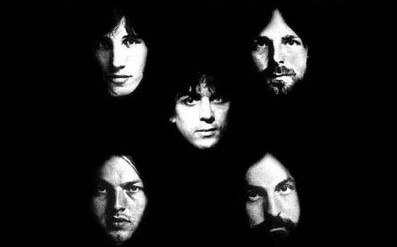
Pink Floyd
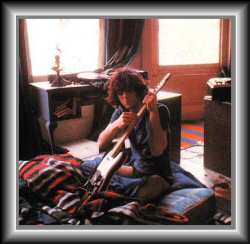





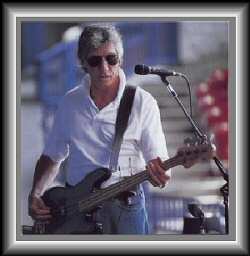
George Roger Waters
United Kingdom
Born September 6, 1943
Roger Waters was a primary creative force in Pink
Floyd from 1965 to
1983. He first met Syd Barrett, who would become the band's lead singer
and guitarist, during his school days when both attended a Saturday art
class. He moved to London to study architecture at Regent Street
Polytechnic and there formed a band with drummer Nick Mason and
keyboardist Rick Wright; he played bass and sang. Barrett joined them,
forming Pink Floyd. Though Barrett was the band's main songwriter at
first, Waters wrote or co-wrote three songs on the first LP, The Piper
at the Gates of Dawn (U.S. release: September 1967), including the sole
composition "Take Up Thy Stethoscope and Walk." By the time of the
group's second album, A Saucerful of Secrets (July 1968), Barrett had
been replaced by David Gilmour and Waters had begun to take a more
prominent role, contributing three songs and one co-composition to the
LP. He also wrote or co-wrote all but one of the tunes for the band's
soundtrack to the film More (July 1969), while his first solo work came
on Ummagumma (November 1969), a two-LP set that consisted of one disc
of live material and a second disc on which each band member
contributed his own tracks. As of Atom Heart Mother (October 1970),
Pink Floyd began to work up its material as a group, though Waters
still contributed the sole composition "If." Working with Ron Geesin,
he wrote the soundtrack for The Body (December 1970), his first work
outside Pink Floyd. He also wrote or co-wrote eight of the ten
selections on Obscured by Clouds (June 1972), Pink Floyd's soundtrack
for the film The Valley. Pink Floyd's recordings were moderately
successful through 1972. But The Dark Side of the Moon (March 1973),
for which Waters wrote all the lyrics and some of the music, was a
commercial breakthrough that became one of the most successful albums
in rock history. (He was the sole author of the album's Top Ten hit
"Money.") He took an increasingly dominant role in the writing of
subsequent Pink Floyd albums, writing all the lyrics and collaborating
on the music for Wish You Were Here (September 1975), writing most of
Animals (February 1977) and The Wall (November 1979), and writing all
of The Final Cut (March 1983). All were million sellers, with The Wall
in particular rivaling the sales of The Dark Side of the Moon. (Waters
was the sole author of "Another Brick in the Wall Part II," a gold,
number one single drawn from The Wall.) Following the release of The
Final Cut, Pink Floyd broke up and its members launched solo careers.
Waters re-emerged with The Pros and Cons of Hitchhiking (April 1984),
which went gold. He followed with Radio K.A.O.S. (June 1987) and went
on tour to promote the release. Meanwhile, David Gilmour's solo album
About Face (February 1984) was also a gold seller, but he was
discouraged by that showing and recruited Mason and Wright to re-form
Pink Floyd. Waters sued, seeking an injunction to prevent the trio from
touring as Pink Floyd without him, but he lost the case, and the
Gilmour-led Pink Floyd went on to tour and recorded successfully.
Following the fall of the Berlin Wall, Waters organized an all-star
performance of The Wall in Berlin on July 21, 1990. It was filmed and
recorded, resulting in the album The Wall - Live in Berlin (September
1990). He released a third solo album, Amused to Death (September
1992), but did not tour, though he made an appearance at a benefit
concert in 1993. He spent much of the 1990s working on an opera, Ca
Ira, in French and English. But in July and August 1999, he mounted his
first U.S. tour in 12 years. It was so successful that he returned for
a second leg in June and July 2000, and the concerts served as the
basis for the two-CD set In the Flesh Live. The Waters camp was
relatively quiet after that, although a collection of singles and album
tracks appeared in the spring of 2002.~ William Ruhlmann ~
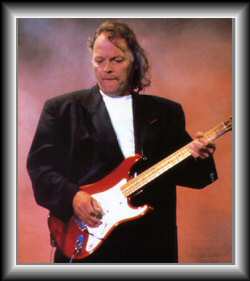
David Jon Gilmour
United Kingdom
Born March 6, 1946
David Jon Gilmour CBE was born on 6 March 1946 in Cambridge, his father a senior lecturer in Zoology at the University. Best known as guitarist, vocalist and writer with Pink Floyd, he is also renowned for solo work and collaborations with other artists including Kate Bush and Dream Academy.
David Gilmour met Roger ‘Syd’ Barrett while attending the Cambridgeshire College of Arts and Technology. Syd joined Roger Waters, Nick Mason and Rick Wright to form Pink Floyd, while David started playing in his own band Jokers Wild, subsequently forming Flowers, later to become Bullitt.
David was asked to augment the Pink Floyd lineup in 1967, only for Syd to leave the group months later, struggling with mental illness. David thus became lead guitarist, sharing lead vocals with Roger Waters.
David’s guitar playing and song writing became major factors of Pink Floyd’s world-wide success during the 1970s, including the distinctive vocals and guitar on ‘Money’, Floyd’s US No. 13 hit of 1973. As a side project, David released his first solo album David Gilmour in 1978. Featuring Rick Wills on bass and Willie Wilson on drums & percussion, the album charted in the UK and the US.
David’s second solo album About Face was released in 1984, again hitting the Top 20 in the UK.
David assumed control of Pink Floyd in 1985, after Roger Waters’ departure, creating the new Floyd album A Momentary Lapse of Reason with Nick Mason and Rick Wright. The Division Bell (1994) was the last Pink Floyd studio album, supported by a 100 date global sell-out world tour. A live album and video, Pulse, followed in 1995. In 1996 Pink Floyd were inducted into the US Rock & Roll Hall of Fame, followed by the same honour in the UK in November 2005.
In July 2005, Pink Floyd reunited with Roger Waters for a one-off performance at Live 8 in London’s Hyde Park, which was regarded by many as the highlight of an astonishing show.
David Gilmour has performed as a session musician, producer and even concert sound engineer, for a wide variety of acts including Roy Harper, Grace Jones, Tom Jones, Elton John, Arcadia, Bryan Ferry, Robert Wyatt, Hawkwind, Paul McCartney, Ringo Starr, Sam Brown, Jools Holland, Propaganda, Pete Townshend, The Who, Supertramp, Warren Zevon, various charity “supergroups” and many more.
In 2002, following a concert for Robert Wyatt’s Meltdown Festival, three semi acoustic concerts were performed by David Gilmour and Friends at London’s Royal Festival Hall, with one critic remarking that a ‘reinvented rock god shines on as 21st century folk hero.’
In 2003 David donated the £3.6 million proceeds of the sale of his London house to Crisis, the charity for the homeless. He commented: “I don't need the money and I just thought it would be a good thing to do”. In November of that year he was awarded a CBE for philanthropy & services to music.
David Gilmour’s position in the canon of rock guitar players can be construed from his headline billing at the 2004 Wembley concert celebrating 50 years of the Fender Stratocaster guitar.
Now in 2005 David is recording a new solo album for release in 2006, to be accompanied by tour dates in the US and Europe.
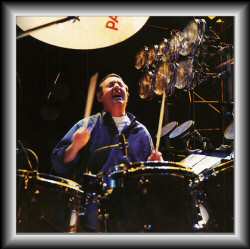
Nicholas Berkeley Mason
United Kingdom
Born January 27, 1944
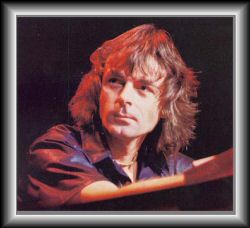
Richard William Wright
United Kingdom
Born July 28, 1945
After David Gilmour replaced Syd Barrett in mid '68 the band gradually redefined their style over half a dozen albums (three of them soundtracks) but it wasn't until 1971's Meddle with the side-long Echoes inspired by WRIGHT's single piano note fed through his Leslie rotating speaker, that the band regained the prospects they'd shown four years earlier..
The next album, Dark Side Of The Moon, ensured their place in rock history. Released in 1973, the album became more than just a soundtrack to a generation (many of whom first discovered the delights of stereo listening to it in headphones). It spent an unprecedented 15 years in the Billboard Top 200 album charts and to date it has sold 28 million copies (rising at the rate of a million a year) making it the third highest selling album ever. WRIGHT co-wrote many of the tracks on this epoch-making album but his most memorable contribution was The Great Gig In The Sky.
The next two albums - Wish You Were Here in 1975 and Animals in 1977 - consolidated their position as one of rock's biggest names but, as frequently happens, the band's phenomenal success put an increasing strain on their personal relationships and the creative tensions gave way to conflict. Solo albums were a safety valve and WRIGHT released Wet Dream in 1978.
By the time they came to record The Wall in 1979 Roger Waters was assuming control of the band. WRIGHT felt the full brunt of this when Waters threatened not to release The Wall unless WRIGHT left the band. WRIGHT spent the next two years as a paid employee, playing The Wall in America, Britain and Germany.
None of this was public knowledge until WRIGHT's name was conspicuously absent from Pink Floyd's 1983 album, The Final Cut. However, within months the band had imploded under the weight of the acrimony between the survivors. WRIGHT released his second solo album, as Zee with Fashion singer Dave Harris, in 1984 called Identity, which he now describes as "an experimental mistake". WRIGHT rejoined Pink Floyd in 1987, after Gilmour and Mason had reconstituted the band, during the recording of A Momentary Lapse Of Reason. He arrived too late to contribute any songs but played on the world tour that confirmed Pink Floyd's status as one of the world's biggest drawing live attractions.
However on Pink Floyd's most recent studio album, The Division Bell, the band returned to the co-operative principles that had got lost during the late '70's. WRIGHT co-wrote Wearing The Inside Out with lyricist Anthony Moore and co-wrote the music for Cluster One, What Do You Want From Me, Marooned, and Keep Talking with David Gilmour. More important, as WRIGHT says, "On this album the three of us actually played together. It's like the Floyd again." Millions of fans felt exactly the same way during Pink Floyd's Division Bell world tour which played over 100 shows, culminating in their 14-night stint at London's Earls Court in the autumn of 1994.
© 1996 EMI Records Ltd

